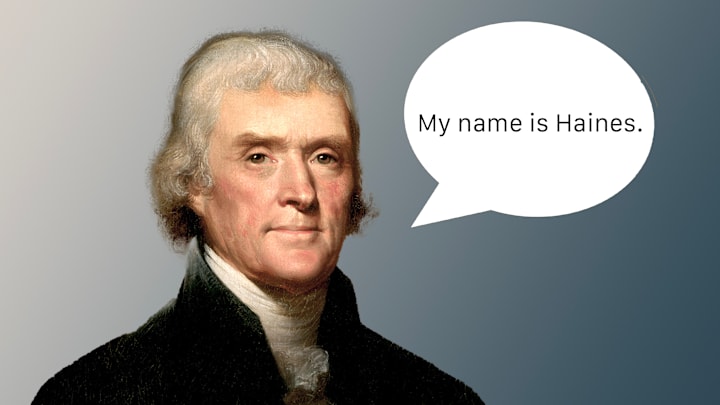There will come a point where you may have a lot of looming goodbyes to say–perhaps you’re moving across the country, or departing a job you’ve held for years. When “goodbye” no longer feels sufficient (or you’re simply tired of saying it), it may be time to turn to a past U.S. president for some linguistic inspiration.
“My Name Is Haines”
In the early 1800s, sometime around the start of his second term as president, Thomas Jefferson was out riding his horse in the countryside near Monticello—his home and plantation on the outskirts of Charlottesville, Virginia—when he happened to bump into a fellow rider who accompanied him on the remainder of his trek. The man he met, however, failed to recognize that his companion was the president of the United States.

As the pair continued their journey, talk soon turned to politics and, unaware that he was riding alongside the president, the man began a lengthy explanation of everything that was wrong with the current political system, from the grassroots of the administration all the way up to Jefferson himself. The Louisiana Purchase of 1803, he declared, had been nothing but “a wild scheme.” The president’s plans for a “gunboat navy” were preposterous. And the 1807 Embargo Act—which halted all U.S. foreign trade in nonviolent protest over the British and French treatment of America during the Napoleonic Wars—was dismissed as a nonsensical and potentially disastrous diplomatic misfire. Throughout it all, however, Jefferson remained characteristically quiet, saying little to defend himself or to counter his companion’s opinions.
You May Also Like ...
- What Does Goodbye Actually Mean?
- Why Is Sneakily Leaving Called an “Irish” Goodbye or Exit?
- 20 Terrific Alternatives to “Hello”
Add Mental Floss as a preferred news source!
Eventually the two arrived back at Jefferson’s home and, despite being almost continuously vilified the entire time, Jefferson coolly asked his companion if he would like to stop a while and join him for some refreshment. He gratefully accepted the invitation, and just as he was about to climb down from his horse, the man finally thought to ask his new friend’s name.
“Thomas Jefferson,” he replied.
The man paused for a moment. “My name is Haines,” he answered bluntly—before galloping away as quickly as he could.
A Phrase That Stuck
This brilliantly self-effacing anecdote first appeared in print in 1840. As it continued to be repeated and retold, both in person and in the press, in the years that followed, the expression My name is Haines soon slipped into everyday use in 19th-century slang as, according to one description, “words appropriate for an abrupt or hurried departure.” For decades, anyone who was forced to leave somewhere prematurely, hurriedly, or awkwardly could excuse their departure with the catchphrase and all would be forgiven. Despite its usefulness, however, My name is Haines seems to have dwindled out of use in the aftermath of the Civil War, until finally, by the start of the 20th century, it had almost entirely vanished from the language.

The fact that no record of the story has ever been uncovered in any of Jefferson’s personal writings (coupled with Jefferson’s longstanding refusal to be accompanied by any of his staff on his daily horse rides, much to the alarm of his colleagues back in Washington) unfortunately makes it impossible to corroborate. What’s more, although the version above is far and away the most commonly held account today, it seems there were numerous versions of it in circulation at the time—including this much more detailed account from The Domestic Life of Thomas Jefferson (1871), in which Jefferson’s critical riding companion accepts his invitation and returns for dinner the following day.
All of this uncertainly has ultimately led some etymologists to believe Jefferson might have concocted the story himself, but whatever the truth may be, there is little doubting the phrase’s eventual popularity in 19th-century America. Two decades after Jefferson’s death, newspapers were still reporting that, “A more common saying, or one in more general use, has never been got up. We hear it in Maine and in Georgia, in Maryland and in Arkansas; it is in the mouths of old and young, the grave and gay—in short, ‘My name is Haines’ enjoys a popularity which no other slang or cant-phrase has ever attained.”
A version of this story originally ran in 2015; it has been updated for 2025.
